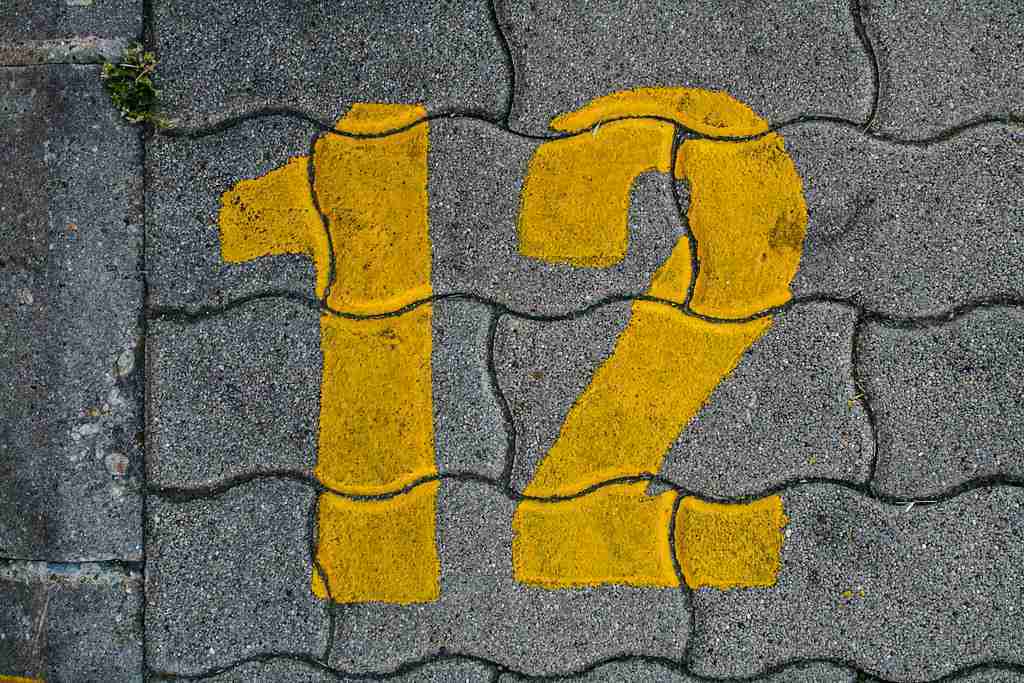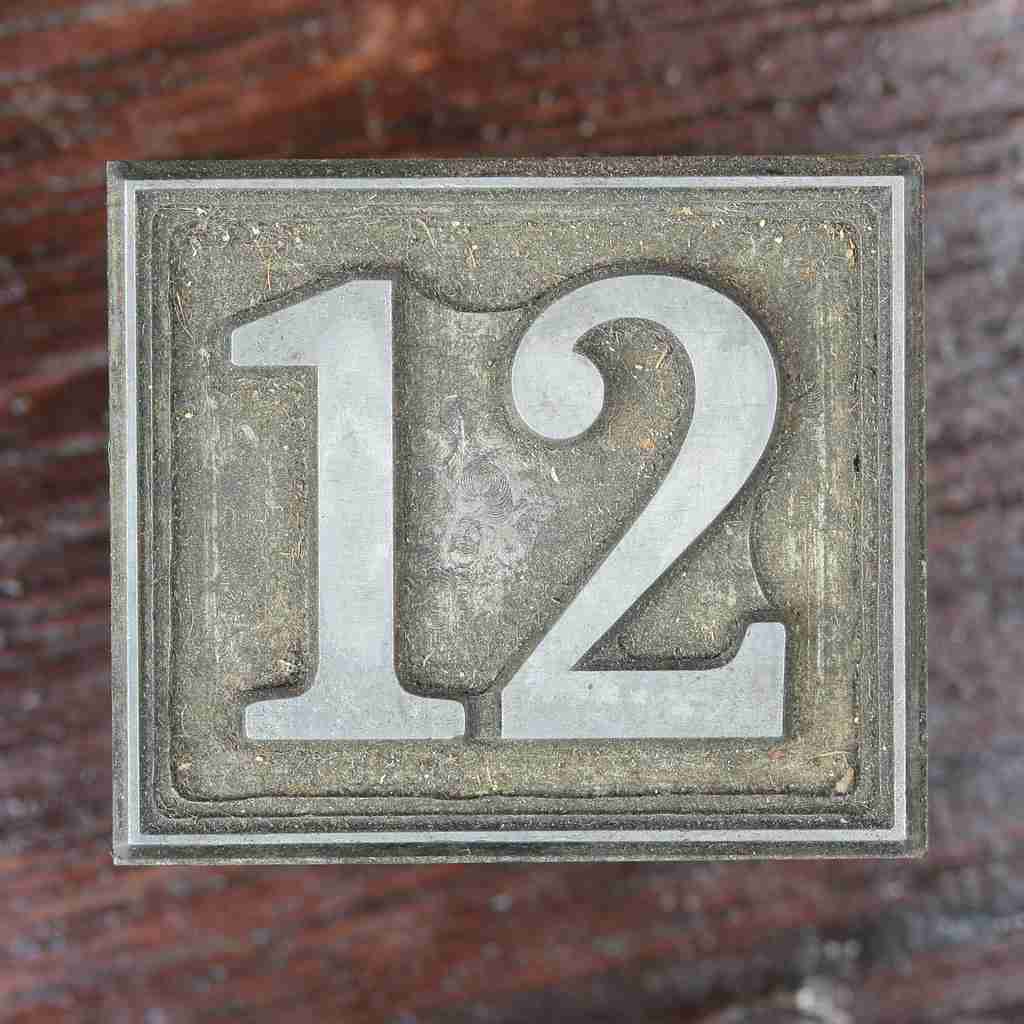22 Fun Facts About Number 12 | A Dozen Delights
1. The number 12 is considered highly auspicious in many cultures worldwide.
In Chinese culture, 12 is believed to represent completeness and harmony, as it is associated with the twelve earthly branches and the twelve animals of the zodiac. Similarly, in Hinduism, there are 12 Adityas (sun gods) that symbolize solar energy and represent different aspects of life.
Furthermore, in numerology, 12 is often regarded as a powerful and positive number, signifying spiritual growth, abundance, and fulfillment.
2. In geometry, a dodecagon is a polygon with 12 sides.
It is a fascinating shape that exhibits unique properties and symmetries. Each interior angle of a regular dodecagon measures 150 degrees, while the sum of all its interior angles totals 1,800 degrees.
The dodecagon’s symmetrical structure lends itself to various applications, such as architecture and design.
3. The 12th element in the periodic table is magnesium, known for its lightness and reactivity.
Magnesium, a highly versatile and abundant metal, exhibits remarkable properties that have captivated various industries.
One such notable characteristic is its exceptionally lightweight nature, making it a highly sought-after material for sectors that prioritize weight reduction, such as aerospace and automotive manufacturing. The utilization of magnesium in these industries has led to advancements in fuel efficiency, improved performance, and enhanced overall sustainability.
Its reactivity allows it to form various compounds, making it essential in numerous chemical reactions and applications.
4. The number 12 holds religious significance in Christianity, with 12 apostles chosen by Jesus.

The Chosen Apostles in Christianity.
These apostles, including Peter, John, and Matthew, played a fundamental role in spreading Jesus’ teachings and establishing the early Christian Church. The number 12 symbolizes completeness and authority, as it represents the twelve apostles who were personally selected by Jesus to continue his mission after his departure.
The New Testament mentions the Twelve Tribes of Israel, further reinforcing the spiritual significance of the number within Christian theology.
5. The Western zodiac comprises 12 astrological signs, each associated with different personality traits.
These signs are Aries, Taurus, Gemini, Cancer, Leo, Virgo, Libra, Scorpio, Sagittarius, Capricorn, Aquarius, and Pisces. Each sign is associated with distinct personality traits, characteristics, and behaviors that are believed to influence individuals born under them.
Astrologers interpret the positions of celestial bodies, such as the sun and planets, within these signs to provide insights into a person’s personality, relationships, and future events.
6. Many ancient civilizations used a duodecimal number system based on 12 instead of our modern decimal system.
This system, which divided quantities into twelve units or subunits and the unique numerical systems of ancient civilizations. One notable example is the Mesopotamian civilization, renowned for its utilization of a sexagesimal system, based on multiples of 60.
In this system, they divided the day into 12 hours of daylight and 12 hours of darkness, showcasing their intricate understanding of time measurement and numerical concepts.
The duodecimal system was also prevalent among the Mayans, who used it in their calendars and mathematical calculations.
7. There are 12 lunar cycles in a year, each lasting about 29.5 days.
Each lunar cycle consists of distinct phases, including the new moon, waxing crescent, first quarter, waxing gibbous, full moon, waning gibbous, third quarter, and waning crescent. The Moon’s gravitational interaction with the Earth and its position relative to the Sun determines these phases.
The lunar calendar, utilized in various cultures throughout history, relied on the observation of these cycles to track time and mark important events, such as religious festivals or agricultural activities.
8. The famous song “The Twelve Days of Christmas” refers to the 12 days between Christmas Day and Epiphany.
“The Twelve Days of Christmas” is a beloved and well-known holiday song that refers to the 12-day period between Christmas Day (December 25th) and Epiphany (January 6th). The song follows a cumulative structure, with each verse adding a new gift given by a lover to their beloved.
While the origins and exact meaning of the gifts mentioned in the song remain a subject of debate, the song itself has become a popular tradition during the Christmas season in many English-speaking countries.
9. There are 12 cranial nerves in the human body, each responsible for various functions.

Functions of Cranial Nerves in the Human Body
These nerves originate directly from the brain and serve various functions, including sensory, motor, and autonomic control. The 12 cranial nerves are named as follows: olfactory, optic, oculomotor, trochlear, trigeminal, abducens, facial, vestibulocochlear, glossopharyngeal, vagus, accessory, and hypoglossal.
These nerves are responsible for transmitting signals and information to and from different parts of the head, face, neck, and vital organs, allowing us to perform essential actions like seeing, tasting, smelling, speaking, and maintaining balance.
10. The 12th astrological house represents the realm of hidden knowledge and spiritual growth.
The twelfth house, one of the things that are 12, symbolizes hidden knowledge, subconscious realms, and spiritual growth. It delves into the mysteries of the unconscious mind, dreams, intuition, and spiritual connections.
Matters related to isolation, seclusion, and the unseen aspects of life are often associated with this house.
11. The Olympic Games have 12 official sports in their modern pentathlon.
The sports included in the modern pentathlon are fencing, swimming, equestrian show jumping, pistol shooting, and cross-country running.
The pentathlon, with its origins rooted in ancient Greek competitions, was reinstated in the modern Olympic Games by Pierre de Coubertin. This dynamic event represents a combination of physical, mental, and strategic abilities, challenging athletes in various disciplines to demonstrate their versatility and skill.
The pentathlon consists of five different events, including running, swimming, fencing, shooting, and show jumping, making it a true test of an athlete’s all-around capabilities.
12. There are 12 jurors in a standard jury trial in many legal systems.
The jury system, an integral component of the justice system, aims to ensure impartial judgment and a fair trial. The 12 jurors, selected from the community, listen to the evidence presented during the trial and collectively determine the guilt or innocence of the defendant.
The jury deliberates on the facts of the case, weighs the arguments, and reaches a verdict based on the evidence and legal instructions provided by the judge.
13. In Hindu mythology, there are 12 main gods and goddesses known as the Adityas.
Hindu mythology encompasses a pantheon of gods and goddesses, and among them, the Adityas hold significant prominence. The Adityas are a group of 12 main deities revered in Hinduism, symbolizing various aspects of cosmic energy and celestial forces.
The Adityas are often associated with the Sun and are considered as solar deities. Each Aditya has a distinct identity and attributes. Some well-known Adityas include Surya (the sun god), Varuna (the god of water and cosmic order), and Mitra (the god of friendship and contracts).
14. There are 12 major gods and goddesses in Greek mythology, known as the Olympians.
The Olympians hold the highest positions in the Greek divine hierarchy and preside over different aspects of human life and the natural world.
The 12 Olympian gods include
Zeus (the king of gods and the sky)
Hera (the queen of gods and marriage),
Poseidon (the god of the sea)
Demeter (the goddess of agriculture)
Athena (the goddess of wisdom and warfare)
Apollo (the god of music and light)
Artemis (the goddess of hunting and the moon)
Aphrodite (the goddess of love and beauty)
Ares (the god of war)
Hephaestus (the god of blacksmiths and fire)
Hermes (the messenger of the gods)
Dionysus (the god of wine and celebration).
15. Many musical instruments, such as guitars and pianos, have 12 notes in an octave.
An octave, which is the interval between two musical pitches with the same name but at different registers. Within an octave, there are 12 notes consisting of both the natural notes (A, B, C, D, E, F, and G) and their respective sharps or flats, giving us a total of 12 distinct pitch classes.
This unique arrangement of 12 musical elements allows for the creation of harmonies, melodies, and intricate compositions.
This musical arrangement, based on the concept of equal temperament, allows for versatile compositions and harmonious melodies across various musical genres.
16. The number 12 symbolizes harmony and completeness, representing the union of the physical and spiritual worlds.
It represents the union of the physical and spiritual worlds, blending the qualities of stability, order, and transcendence.
The concept of completeness associated with the number 12 can be observed in various aspects of human experiences, such as the 12 months in a year, the 12 signs of the zodiac, and the 12 hours on a clock face. More
over, in numerous mythologies and religions, the number 12 holds profound significance, representing wholeness and perfection.
17. In the Chinese zodiac, each year is associated with one of the 12 animal signs.
These animal signs, known as the Shengxiao, play a significant role in Chinese astrology and are believed to influence one’s personality traits, compatibility with others, and even future prospects.
The 12 animal signs in the Chinese zodiac are the rat, ox, tiger, rabbit, dragon, snake, horse, goat, monkey, rooster, dog, and pig. Each animal sign is associated with specific characteristics and qualities, reflecting the diverse range of human attributes.
18. The 12 disciples of Buddha, known as the Dvādaśa Arahants, played a significant role in spreading his teachings.

Role in Propagating His Teachings.
According to Buddhist tradition, Gautama Buddha had 12 disciples, known as the Dvādaśa Arahants or the Twelve Arahants. These disciples were enlightened individuals who attained the highest state of awakening, known as arahantship.
Each disciple possessed unique qualities and skills that contributed to the dissemination and preservation of Buddha’s teachings.
The Dvādaśa Arahants played a pivotal role in the early development of Buddhism, helping to establish monastic communities, conveying the teachings to future generations, and expanding the reach of the Buddha’s message.
19. In the Arthurian legend, King Arthur is said to have had 12 Knights of the Round Table.
According to Arthurian legend, King Arthur gathered a group of 12 noble and valiant knights, forming the esteemed Knights of the Round Table.
This distinguished group, including notable figures like Sir Lancelot, Sir Gawain, and Sir Percival, embarked on quests and adventures alongside King Arthur, upholding chivalry, righteousness, and the pursuit of noble ideals.
The Round Table itself was a symbol of equality and unity, as there was no head or foot on the table, signifying that all knights were equal in status and worth.
20. Twelve is considered a highly composite number, as it has more divisors than any smaller positive integer.
A composite number is a positive integer greater than one that has divisors other than itself and one. Twelve possesses more divisors than any smaller positive integer, making it highly versatile in mathematical calculations. It has a total of six divisors: 1, 2, 3, 4, 6, and 12.
This property makes twelve favorable in various mathematical and practical contexts, including factorization, fraction simplification, and finding common denominators.
21. What does the number 12 symbolize?
The number 12 is often associated with completeness, harmony, and divine order. In many traditions, it represents a perfect and balanced system, as it can be divided evenly into smaller parts (1, 2, 3, 4, 6).
The number 12 is significant in religious and mythological contexts, such as the twelve zodiac signs, the twelve disciples of Jesus Christ, and the twelve months of the year. It can also symbolize cycles and transitions, as there are twelve hours in a day and twelve hours in a night.
22. What does the life path number 12 mean in numerology?

In numerology, the life path number, which is derived from an individual’s birthdate, holds fascinating insights about their life purpose and characteristics.12 reveal its significance in various cultures and disciplines, including the 12 signs of the zodiac, the 12 months in a year, and even the 12 apostles in Christianity.
The life path number is typically calculated by reducing all the digits of the birthdate to a single digit, except for the numbers 11 and 22, which are considered master numbers.
FAQs
The number 12 is considered powerful for several reasons across different cultures and contexts.
Here are a few explanations:
Mathematical significance: Twelve is divisible evenly by 1, 2, 3, 4, and 6, making it a highly composite number. This property gives it mathematical significance and makes it useful for various calculations and divisions.
Astronomical significance: There are twelve months in a year, corresponding to the twelve zodiac signs and the twelve constellations in Western astrology. Additionally, ancient civilizations observed twelve full moons in a year, leading to the development of lunar calendars.
Cultural and historical significance: In many cultures, the number 12 holds symbolic value. For example, there were twelve disciples of Jesus in Christianity, twelve Olympian gods in Greek mythology, twelve knights of the Round Table in Arthurian legends, and twelve Imams in certain branches of Islam. These associations contribute to the number’s perceived power and significance.
In the Bible, the number 12 holds great symbolism and is associated with completeness, divine authority, and God’s governance.
Here are a few significant mentions of the number 12:
Twelve Tribes of Israel: In the Old Testament, Jacob had twelve sons who became the progenitors of the twelve tribes of Israel. Each tribe represented a distinct lineage and played a crucial role in the history and identity of Israel.
Twelve Apostles: Jesus chose twelve disciples, known as the apostles, to accompany him during his ministry. They were considered the foundation stones of the Christian faith and were entrusted with spreading his teachings to the world.
New Jerusalem: In the Book of Revelation, the final book of the Bible, the New Jerusalem is described as a city with twelve gates, twelve foundations, and twelve angels. The number 12 symbolizes the completeness and perfection of this heavenly city.
The number 12 has various meanings across different cultures and contexts. Here are a few common interpretations:
Completeness: The number 12 is often associated with completeness, as it represents a full cycle or all-encompassing nature. This can be seen in the twelve months of a year, the twelve signs of the zodiac, and the twelve hours on a clock.
Order and organization: Twelve is often connected to systems of order and organization. For example, there are twelve inches in a foot and twelve jurors in a jury. It represents a structured and balanced arrangement.
Harmony and balance: The number 12 is associated with harmony and balance due to its divisibility by multiple numbers. It combines the energies of 1 (independence, leadership) and 2 (partnerships, cooperation) to create a harmonious and balanced whole.
The spiritual meaning of the number 12 is often linked to spiritual completion, divine guidance, and a higher spiritual order. It represents the union of heaven and earth, the integration of spiritual and material aspects, and the attainment of spiritual wholeness. The number 12 is seen as a symbol of spiritual enlightenment, divine intervention, and the manifestation of higher wisdom.







